| “We don’t do [ Iraqi ] body counts.” |

IRAQ WAR CO$T
(JavaScript Error)
u.s. dead the coffins iraqi casualties |

|
| President Bush made clear that he was frustrated that the Iraqi people had not shown greater public support for the American mission. |
|
"If we believe absurdities, we shall commit atrocities."
"A country without a conscience is a country without a soul, and a country without a soul
is a country that cannot survive."
"Throw some candy in the schoolyard.
"It's a lot of fun to fight. It's a hell of a hoot. It's fun to shoot people.
I'll be right upfront with you, I like brawling."
"The Iraqis are sick people and we are the chemotherapy.
I am starting to hate this country. Wait till I get hold of a friggin' Iraqi.
No, I won't get hold of one. I'll just kill him."
"More work needs to be done here. I think we have done our part to make things better."
"There is a line in our time, and in every time, between those who believe all men are created equal, and
those who believe that some men and women and children are expendable in the pursuit of power. There is a
line in our time, and in every time, between the defenders of human liberty and those who seek to
master the minds and souls of others."
"The world has also seen the nature of the young men and women who fight on our behalf.
They are showing kindness and respect to the Iraqi people."
"It has become appallingly obvious that our technology has exceeded our humanity."
"The best slogan I can leave for the U.S.A. would be, 'We can and we've got to do
better than this.' "
"Tell me, Daskal, when did we become the Nazis?"
"No human being is illegal"
|
|
 |
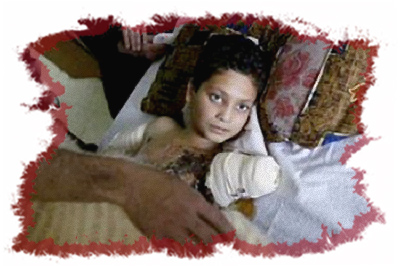 |
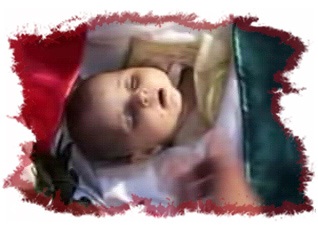 |
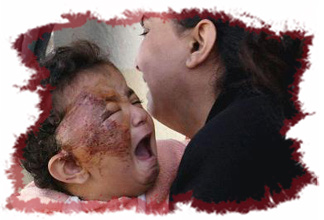 |
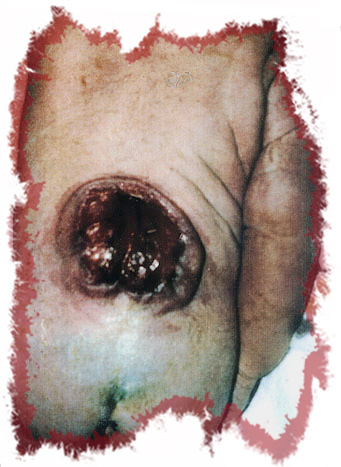 |
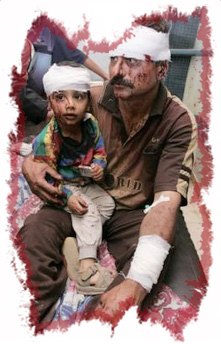 |
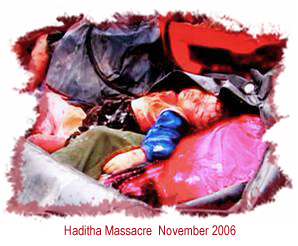 |
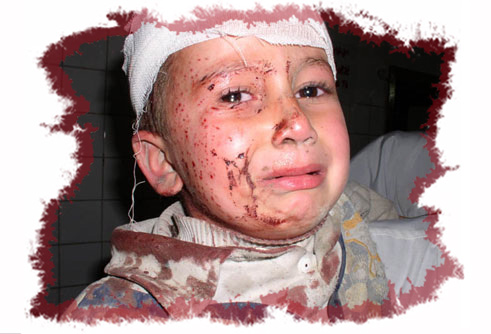 |
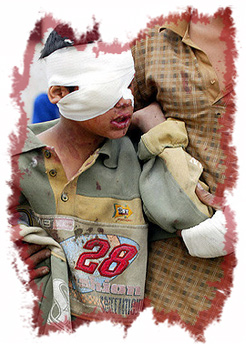 |
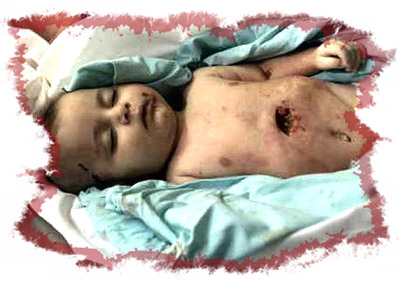 |
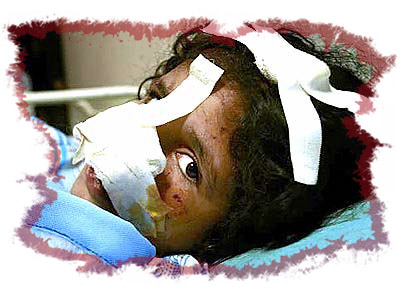 |
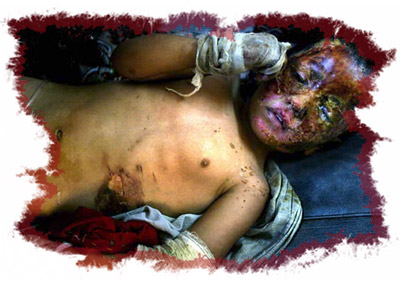 |
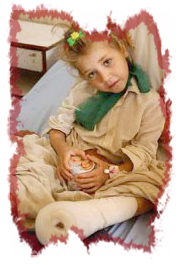 |
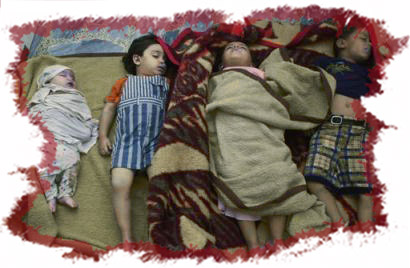 |
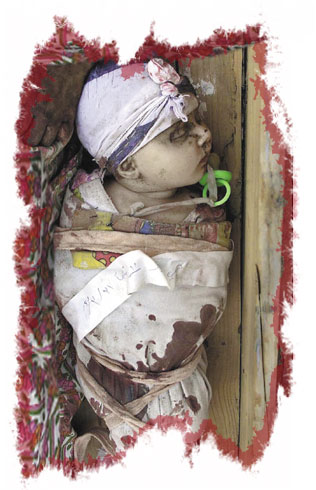 |
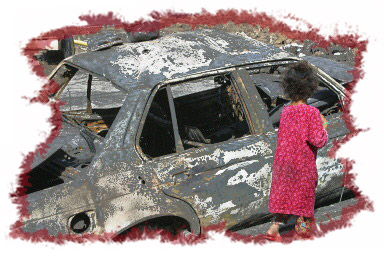 |
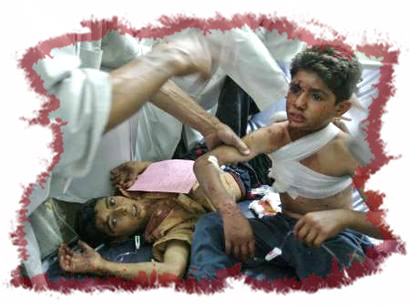 |
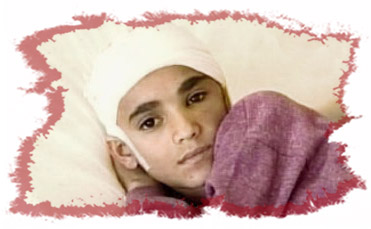 |
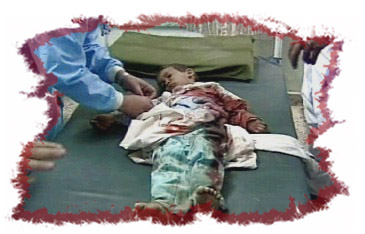 |
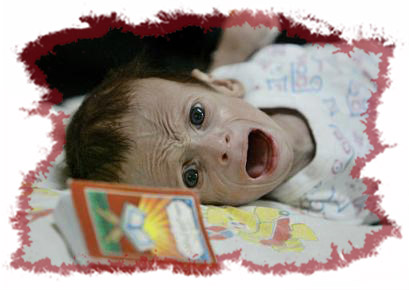 |
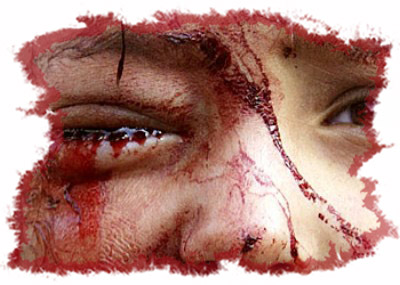 |
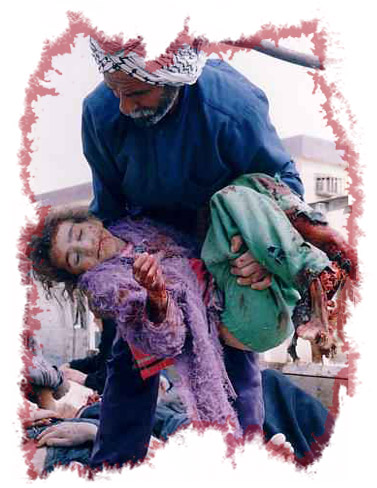 |
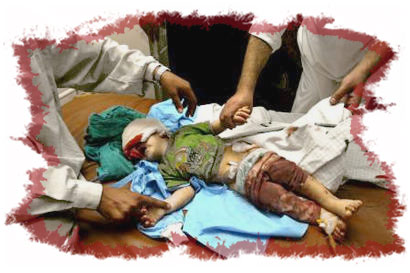 |
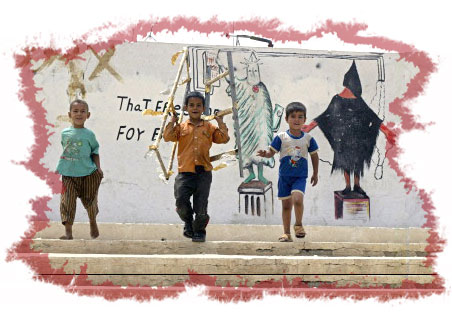 |
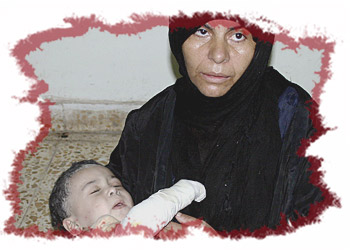 |
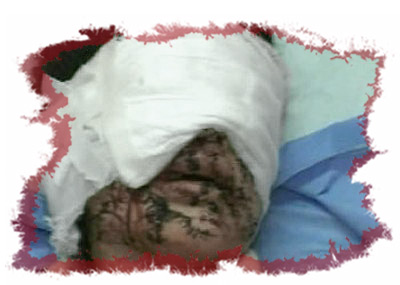 |
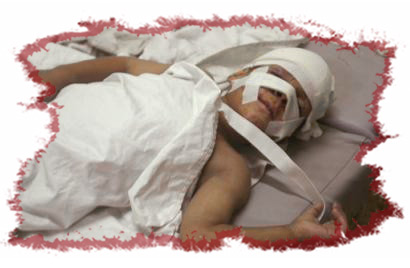 |
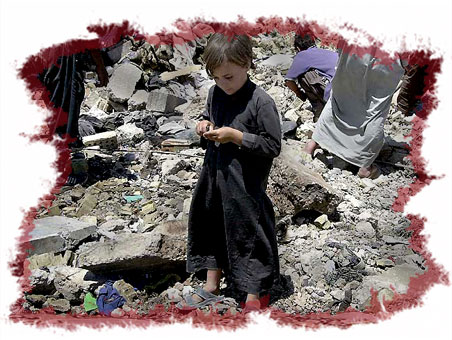 |
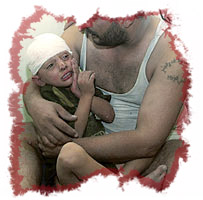 |
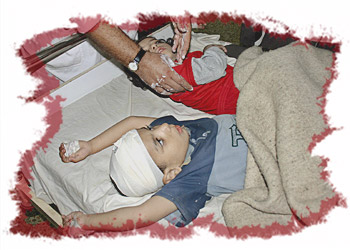 |
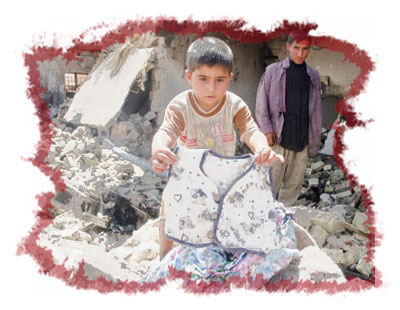 |
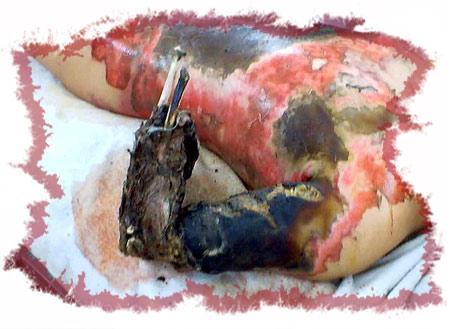 |
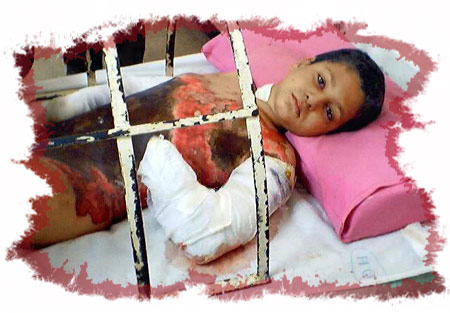 |
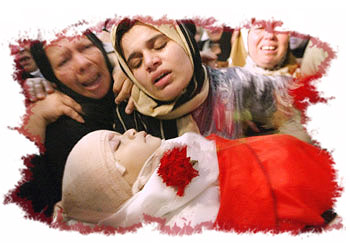 |
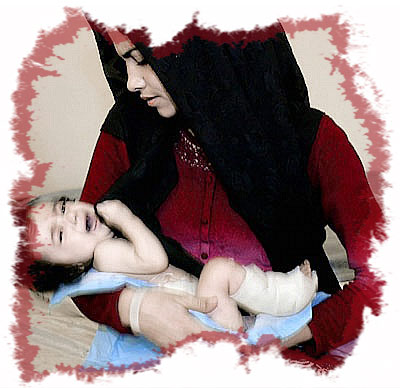 |
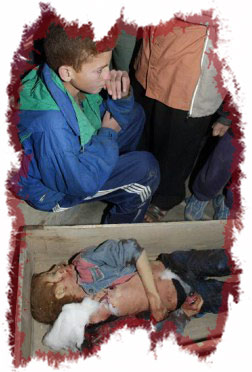 |
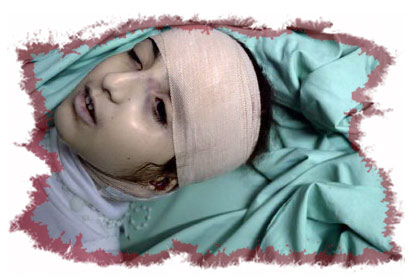 |
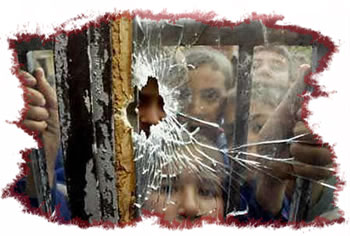 |
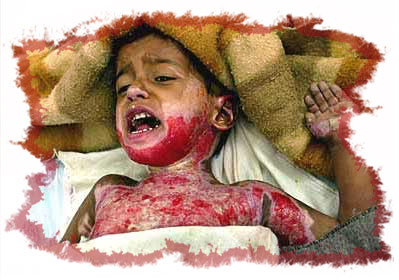 |
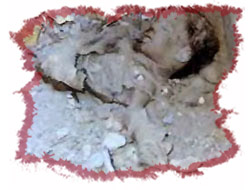 |
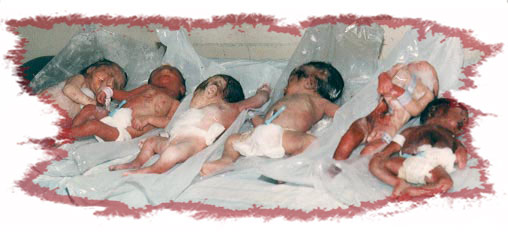 |
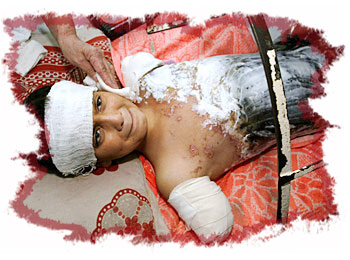 |
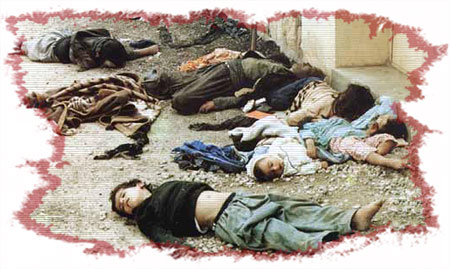 |
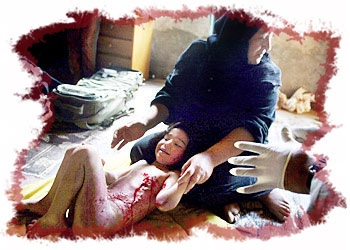 |
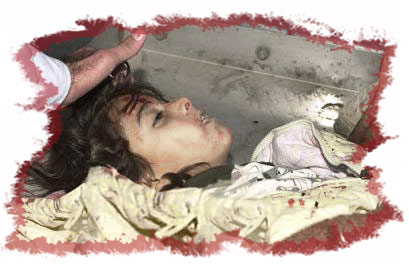 |
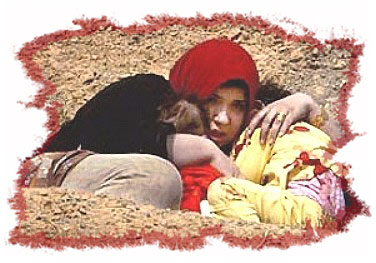 |
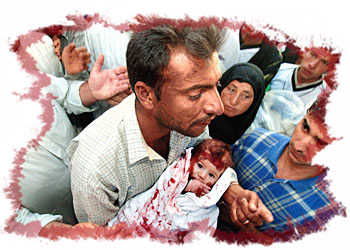 |
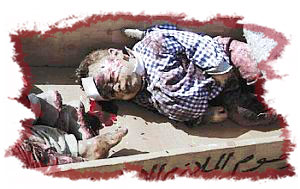 |
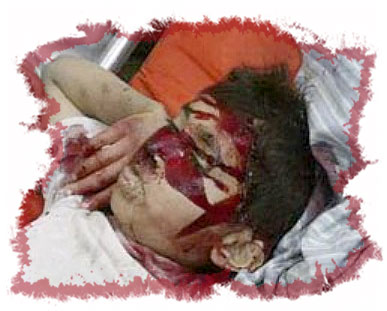 |
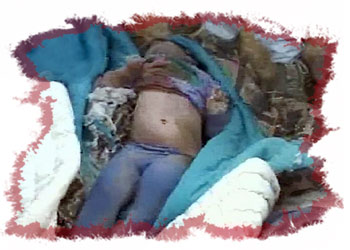 |
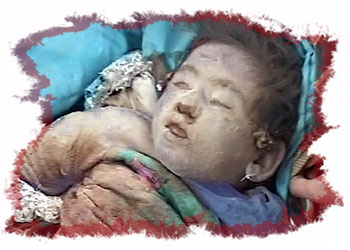 |
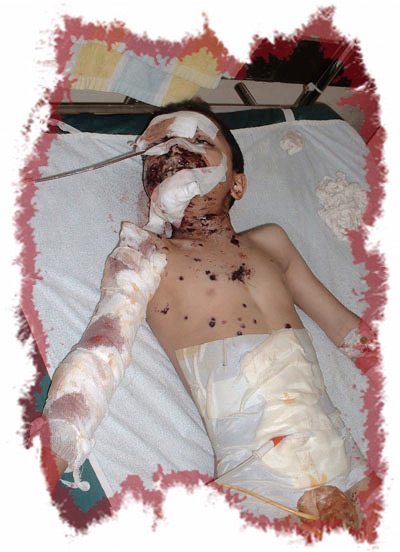 |
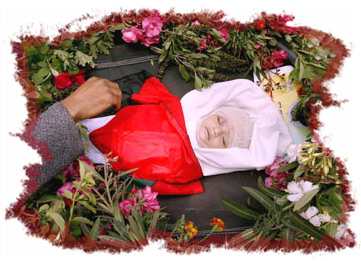 |
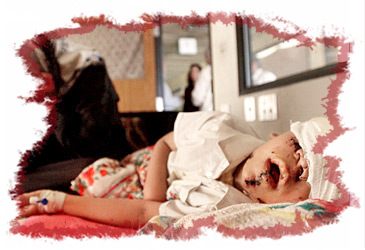 |
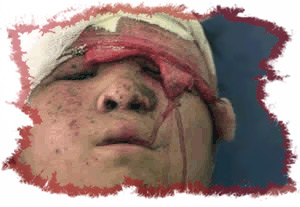 |
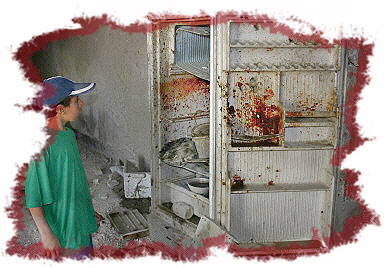 |
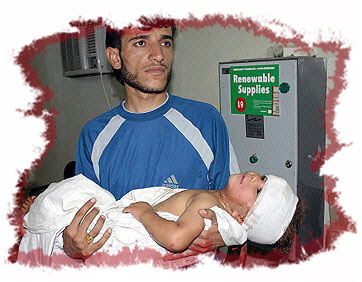 |
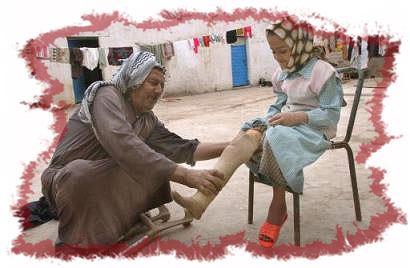 |
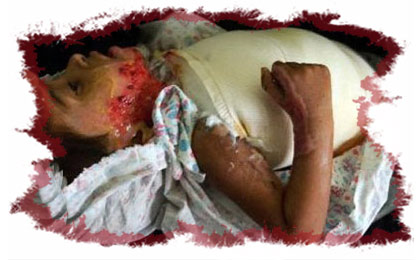 |
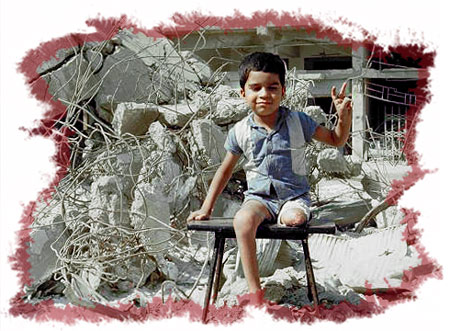 |
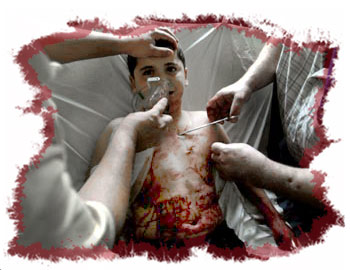 |
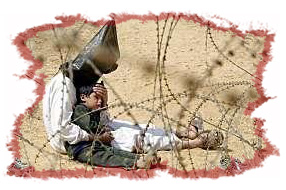 |
 |
|
Medic Details Finding Iraqi Girl's Body By RYAN LENZ, Associated Press Writer
An Iraqi army medic on Sunday told a U.S. military hearing of the horrific scene that confronted him in a tiny home south of Baghdad where he found the naked and burned body of a 14-year-old girl allegedly raped and murdered by American soldiers. The medic testified on the opening day of a hearing to determine whether five U.S. soldiers must stand trial in the March 12 rape-slaying of Abeer Qassim al-Janabi and the killing of her parents and sister in the town of Mahmoudiya. It is among the worst in a series of cases of alleged killings of civilians and other abuses by U.S. soldiers that have tarnished the American military. The medic, whose name was withheld for security reasons, testified that he was the first responder to enter the house, arriving between 3 p.m. and 4 p.m. on the day of the killings. The girl was sprawled naked in the house, her torso and head burned by flames, and she had a single bullet wound under her left eye, he said. He said he found Abeer's 5-year-old sister, Hadeel, in an adjacent room dead from a bullet wound in the head. The children's father, Qassim, and mother, Fikhriya, suffered similar deaths, he said. The mother's abdomen and chest were riddled with bullets, he added. "I was feeling very bad," he said. "I was sick for almost two weeks." He told the hearing that because Mahmoudiya's hospital did not have enough space to store the bodies, they were kept in an air-conditioned ambulance overnight, then buried the following day. Four soldiers — Sgt. Paul E. Cortez, Spc. James P. Barker, Pfc. Jesse V. Spielman and Pfc. Bryan L. Howard — have been accused of rape and murder and could face the death penalty if the case is passed for a court-martial. A fifth, Sgt. Anthony W. Yribe, is accused of failing to report the attack but is not alleged to have been a direct participant. A former private, Steven D. Green, was arrested in North Carolina in June on rape and murder charges in the case. Green, who was discharged from the Army for a "personality disorder," has pleaded not guilty in federal court and is being held without bond. The commander of the soldiers' battalion in the 502nd Infantry Regiment, 101st Airborne Division, Lt. Col. Thomas Kunk, testified Sunday that he recalled hearing Green say "all Iraqis are bad people." "I told him that that wasn't true and that 90 to 95 percent of the Iraqi people are good people, and they want the same thing that we have in the United States," Kunk said. Sunday's proceeding is referred to as an Article 32 hearing and is the military equivalent of a grand jury session. It is expected to last several days, and parts will be held in secret. During cross-examination, Kunk said Green, Cortez and Spielman were "wallowing in self-pity" amid the violence and loss of comrades in the Mahmoudiya area, known in Iraq as the "Triangle of Death." They sought help for combat stress, Kunk said. Much of Sunday's testimony focused on whether the accused soldiers were suffering from combat stress and whether such emotional trauma might have led them to commit the crimes. Kunk estimated that about a quarter of the soldiers in his battalion suffered from some form of combat stress, including sleepless nights, nightmares, perpetual nervousness and chronic nausea. However, "the majority of the platoon, in my opinion, were able to accept the loss of their brothers in arms," Kunk told defense lawyer Capt. Jimmie Culp. "I believe every soldier wakes up every morning wanting to do the right thing. I don't believe any soldier wakes up thinking 'I want to be screwed up.'" The medic was among three Iraqi witnesses to testify Sunday. Reporters were not permitted to hear the first two but were allowed back in the hearing room when the medic took the stand. The military prosecutor, Capt. William Fischbach, showed him several photographs of the bloody crime scene to confirm the bodies were as he found them when he entered the room. All of the accused watched expressionless as the photos were shown to attorneys. Defense lawyers contended the bodies were staged for the pictures. They also questioned whether the victims were shot to death, suggesting they may have already been dead when bullets were fired into their bodies. The medic acknowledged after questioning he could only assume the family was shot to death. Since the case became public last month, U.S. officials have said they were concerned it could strain relations with Iraq's new government if Iraqis perceive that the soldiers receive lenient treatment. They have offered assurances that the case will be pursued vigorously and that the soldiers will be punished if convicted. The case already has increased demands for changes in an agreement that exempts U.S. soldiers from prosecution in Iraqi courts. And Prime Minister Nouri al-Maliki has demanded an independent investigation. Kunk said he was told on June 19 about possible American involvement in the alleged murders and rape. He said he questioned Barker and Howard the next day, and both denied any coalition soldiers were involved. The battalion commander described Baker as "very flippant, very confident, and more than willing to answer the questions I had." U.S. soldiers' conduct has come under the spotlight over a string of similar cases. Four soldiers from another regiment in the 101st Airborne have been accused of killing three Iraqi detainees in Samarra three months ago. The Article 32 hearing in that case ended Friday in Tikrit but no decision on a trial was announced. In another case, the Marine Corps and Navy prosecutors are reviewing evidence to determine whether to recommend criminal charges against Marines accused of killing 24 Iraqi civilians in Haditha in November. |
|
Iraq Launches Own Probe of Rape-Slay Case
ASSOCIATED PRESS The Iraqi investigation into the rape-slaying started Thursday and was expected to take one week, said chief prosecutor Adnan Mahmoud of the criminal court in Mahmoudiya, 20 miles south of Baghdad, where the March 12 assault took place. Mahmoud is part of the investigation panel along with Mahmoudiya's mayor, police chief and the head of the town's main hospital. He said the panel interviewed witnesses and inspected the house where Abeer Qassim al-Janabi, 14, was raped, shot dead and set on fire, allegedly by a group of U.S. soldiers who had observed her for days. Also killed in the house were her 5-year-old sister and parents.
Five soldiers face charges U.S. authorities arrested five soldiers and a former private in connection with the case. The active-duty soldiers faced a military hearing earlier this month to determine if they should be court-martialed. A decision is pending. "We will do our best to try to get those soldiers to stand trail in an Iraqi court. If not we will try them in absentia," Mahmoud said. He said the investigation was ordered by Prime Minister Nouri al-Maliki, who has made it clear he wants the soldiers tried in an Iraqi court. The United States is not expected to allow that but has assured al-Maliki that the case will be pursued vigorously under the American justice system and that the soldiers will be punished if convicted. Still, the case has increased demands for changes in an agreement that exempts U.S. soldiers from prosecution in Iraqi courts.
Case under the spotlight
"The accused U.S. soldiers were not involved in military action when they committed the crime, so they should not enjoy immunity given to U.S. soldiers," he said. "We are trying to keep this case under the spotlight as long as possible so that it is not forgotten and the criminals are able to get away." The soldiers accused of rape and murder, Spc. James P. Barker, Sgt. Paul E. Cortez, Pfc. Jesse V. Spielman and Pfc. Bryan L. Howard, could face the death penalty if they are convicted by a court-martial. Another soldier, Sgt. Anthony W. Yribe, is accused of failing to report the attack but is not alleged to have been a direct participant. Former Pfc. Steven D. Green was discharged from the Army for a "personality disorder" after the incident and was arrested in North Carolina in June on rape and murder charges. He has pleaded not guilty in federal court and is being held without bond. The rape-slaying has increased calls for the withdrawal of American forces at a time when U.S. commanders are trying to stamp out a Sunni Arab insurgency grinding on more than three years after the ouster of Saddam Hussein.
|
|
US Attack Kills Iraqi Children
By James Shaw, BBC News, Baghdad
The attack took place in Diyala province north-east of Baghdad, the sources say.
A spokesman for the US military said there had been helicopter activity
in the area but he was not able to confirm any other details.
The school is in the village of al-Nedawat close to the Iranian border.
Investigation
The school was said to have been hit when the aircraft returned fire.
The officer said police had spoken to eyewitnesses and that six
children had been killed and six injured but the figures have not been
independently confirmed.
A spokesman for the US forces in Iraq, Lt-Col Chris
Garver, said the US tried to do everything possible to avoid civilian
casualties, which was why it was taking the reports seriously and
conducting an investigation.
There has been an escalation of violence in Diyala in recent weeks.
On Sunday, a convoy of US armoured vehicles was hit by a bomb which
killed six soldiers and a Russian journalist who was travelling with
them.
|
|
REUTERS
100,000 Excess Civilian Iraqi Deaths Since War — study LONDON (Reuters) - Tens of thousands of Iraqis have been killed in violence since the U.S.-led invasion last year, American public health experts have calculated in a report that estimates there were 100,000 "excess deaths" in 18 months. The rise in the death rate was mainly due to violence and much of it was caused by U.S. air strikes on towns and cities. "Making conservative assumptions, we think that about 100,000 excess deaths, or more have happened since the 2003 invasion of Iraq," said Les Roberts of the Johns Hopkins Bloomberg School of Public Health in a report published online by The Lancet medical journal. "The use of air power in areas with lots of civilians appears to be killing a lot of women and children," Roberts told Reuters. The report came just days before the U.S. presidential election in which the Iraq war has been a major issue. Mortality was already high in Iraq before the war because of United Nations sanctions blocking food and medical imports but the researchers described what they found as shocking. The new figures are based on surveys done by the researchers in Iraq in September 2004. They compared Iraqi deaths during 14.6 months before the invasion in March 2003 and the 17.8 months after it by conducting household surveys in randomly selected neighbourhoods. Previous estimates based on think tank and media sources put the Iraqi civilian death toll at up to 16,053 and military fatalities as high as 6,370. By comparison about 849 U.S. military were killed in combat or attacks and another 258 died in accidents or incidents not related to fighting, according to the Pentagon.
VERY BAD FOR IRAQI CIVILIANS "What we have evidence of is the use of air power in populated urban areas and the bad consequences of it," Roberts said. Gilbert Burnham, who collaborated on the research, said U.S. military action in Iraq was "very bad for Iraqi civilians". "We were not expecting the level of deaths from violence that we found in this study and we hope this will lead to some serious discussions of how military and political aims can be achieved in a way that is not so detrimental to civilians populations," he told Reuters in an interview. The researchers did 33 cluster surveys of 30 households each, recording the date, circumstances and cause of deaths. They found that the risk of death from violence in the period after the invasion was 58 times higher than before the war. Before the war the major causes of death were heart attacks, chronic disorders and accidents. That changed after the war. Two-thirds of violent deaths in the study were reported in Falluja, the insurgent held city 50 km west of Baghdad which had been repeatedly hit by U.S. air strikes. "Our results need further verification and should lead to changes to reduce non-combatant deaths from air strikes," Roberts added in the study. Richard Horton, editor of The Lancet, said the research which was submitted to the journal earlier this month had been peer-reviewed, edited and fast-tracked for publication because of its importance in the evolving security situation in Iraq. "But these findings also raise questions for those far removed from Iraq — in the governments of the countries responsible for launching a pre-emptive war," Horton said in an editorial.
|
|
The UN children’s fund Unicef has called for an additional $42 million to fund child health initiatives and warned of the
dire state of children’s health in the war-torn country.
The spectre of disease is all the more frightening because of the gutting of the country’s public health system, which has
suffered from a mass exodus of doctors and other trained professionals.
The violence and displacement has also cut off thousands of families from health care, preventing children from receiving
treatment for the physical and psychological wounds inflicted by the appalling violence.
"I will never forget the image of my mother and brother lying on the ground covered with blood," Ziad says, referring to
the aftermath of a car bomb intended for the local courthouse in his hometown of Kirkuk, north of Baghdad.
His physical injuries will not prevent him from one day leading a relatively normal life, but the psychological impact of
the attack will last a lifetime, as it will for thousands of Iraqi children.
Nawzad Mahmud, nine, escaped a similar car bomb with only a wound to his right leg, but when the dust cleared he was
surrounded by the smouldering corpses of four other children.
"Nawzad is bitter. It was so frustrating for him to see the other kids at school that he quit," said his father, Mahmud Shakir.
The relentless violence in Iraq will leave behind not only an entire generation of traumatised children like Nawzad, but hundreds
of permanently disabled children without proper medical care.
Abdullah Mahmud, seven, is disfigured from mortar shrapnel that tore through him flesh during a fire fight in the northern town
of Samarra. His posture is twisted because of a fractured pelvis and he can not move his hand.
"My son cannot study or play with his peers because of his handicap," his father Mahmud Ahmed said. "Our children have paid a
high price for the struggle here."
"Thirty per cent of registered handicapped children were the victims of car bombs and roadside bombs," said Qamar Abdul Rahman,
who heads the Red Crescent in Baghdad. "There are desperate cases, some that cannot be treated in Iraq."
While the trauma wards of the country’s hospitals are regularly flooded with patients, the Iraqi health care system is declining
as doctors join the mass exodus of qualified professionals.
"We do not have enough staff or equipment in our hospital that meets the needs of the patients and victims we receive," said
Abdul Hamid Rashid, a doctor in Samarra’s hospital.
The lasting wounds inflicted on children in Iraq cut across the country’s bitter sectarian divide. In Ramadi, capital of the
restive Sunni province of Anbar to the west, Yas Khidhir, nine, was paralysed from the waist down after he was caught in the
crossfire between US forces and insurgents.
"I had just left school and was surprised to find myself on a battlefield. I got hit in my back and now I am paralysed," said
Yas from his wheelchair.In the southern city of Basra, Hassan Nasir, six, was paralysed on his right side when shrapnel
struck him during a clash between Shia militiamen and British forces.
"I put Hassan in Al-Sadr hospital, but his situation did not improve after two months there. Then British forces treated him
at their own hospital, but his handicap is permanent," said the boy’s father, Nassir Hassan.
In the Shia holy city of Karbala, Ali Murtadha, 10, had shrapnel tear through his leg when mortars slammed into his primary
school. "His injury is critical, and it may force us to amputate his leg," said Dr Abdul Razeq Khalaf. "Locally, we do not
have adequate capabilities or the medical equipment to save this child."
|
|
US Soldier Kills Rare Tiger Bagdad - An American soldier shot and killed a rare Bengal tiger in Baghdad zoo during an apparently drunken party, the head of the zoo said on Saturday."The soldiers arrived in the evening with food and beer, accompanied by a group of Iraqi police officers," Adel Salman Musa said of the incident on Thursday night. "One of the soldiers, who the Iraqi police said had drunk a lot, went into the cage against the advice of his colleagues and tried to feed the animal, who severely hurt his arm," he explained to AFP. The tiger tore off one of the soldier's fingers and mauled his arm. One of the other soldiers immediately fired at the animal and killed it, he said. "The soldiers don't have the right to behave like that. That was the most precious and valuable animal in the whole zoo. It was 14-years old and had been born here," Salman Musa said. The Bengal tiger is an endangered species which is protected by the Convention on International Trade in Endangered Species of Wild Fauna and Flora (CITES) and the World Conservation Union (IUCN). There are only 3,000-4,500 of these creatures left in the wild. Salman Musa said US soldiers often held parties in the zoo in the evenings. "We have no way of stopping them," he said. US Sergeant Mark Ingham confirmed to AFP that an American soldier had killed the tiger on Thursday and said the incident was being investigated. Baghdad zoo reopened to the public in July. It houses 44 animals other than the prized tiger, most of which came from the palaces of deposed leader Saddam Hussein and his late son Uday, who was a lover of big cats. A number of its animals were stolen in the confusion that followed the US-lead war. Most were killed for food or were stuffed and sold.
|
|
George W. Bush, will you please go now!
The time is now.
by Art Buchwarld & Dr. Seuss |
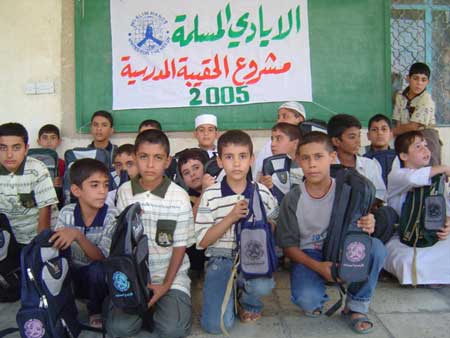 The day his mother and brother died is permanently one that eight-year-old Iraqi Ziad Irhaima will never forget, as the
cauterised stump of one of his arms serves as a permanent reminder.
The day his mother and brother died is permanently one that eight-year-old Iraqi Ziad Irhaima will never forget, as the
cauterised stump of one of his arms serves as a permanent reminder.